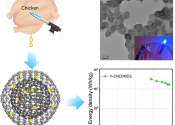Harvesting unused micro-vibration to generate electricity
Energy Harvesting is a green technology that captures (or "harvests") wasted energy and converts it into electricity. The ubiquitous vibrations that surround us are one of the promising sources for energy harvesting. In particular, ...
Jun 25, 2024
0
1









